Design for Water—Framework for Design Excellence
Good design conserves and improves the quality of water as a precious resource.
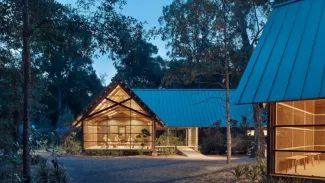
- How does the project use water wisely, addressing efficiency and consumption while matching water quality to appropriate use?
- How can the project’s water systems maintain function during emergencies or disruptions?
- How does the project handle rainfall and stormwater responsibly?
- How does the project contribute to a healthy regional watershed?
Focus topics
- Climate change, water resilience, and equity
- Potable water efficiency
- Outdoor water use reduction
- Rainwater/stormwater use and management
- Process water reuse
- Reuse of greywater and/or blackwater
- Net zero water building (NZWB)
Design for Water toolkit
If you can do only one (or a few) thing(s):
- ZERO CARBON: Incorporate water reuse and reduction strategies and understand the relationship between energy, water, and carbon.
- RESILIENT: Project future climate conditions and establish strategies to manage water at the building and site, including effects on the watershed.
- EQUITABLE: Identify stakeholders impacted by water use decisions and take steps to correct historic inequities.
- HEALTHY: Protect water sources for the site, downstream communities, and future consumers. Understand the water quality delivered to the site and emitted from the site.
Climate change, water resilience, & equity
Vulnerable communities are often the hardest hit by water-related crises. As of 2017, over 1.1 million individuals in the United States lacked access to complete plumbing facilities of which 73% were households located in cities. Where water service is available, it doesn’t mean it is affordable. The lowest 20% of earners spend almost one-fifth of their monthly household income on water. In virtually every community, there are some vulnerable populations—including elderly, disabled, and low-income residents—who struggle to pay their water bills.
Water shapes economic growth, the environment, and the social fabric of our communities. By engaging water stakeholders in a project's decision-making, project teams can help all communities preserve access to safe, clean, affordable drinking water and share in the economic, social, and environmental benefits of high-quality, equitable, and resilient water systems.
Water resilience refers to the ability of an individual, community, or other scaled system to respond and adapt to crises—and to treat them as opportunities for transformation and improvement. It encompasses the capacity of all people—including vulnerable communities—to respond to shock and trauma of all kinds. In the context of water, resilience is the ability to withstand the vulnerability caused by climate impacts and natural disasters. Water equity refers to just and fair inclusion—a condition in which everyone has an opportunity to participate and prosper.
Water equity occurs when all communities have access to safe, clean, affordable drinking water and wastewater services; are resilient in the face of floods, drought, and other climate risks; have a role in decision-making processes related to water management in their communities; and share in the economic, social, and environmental benefits of water systems.
Each day, more and more Americans are confronting an unsettling fact of life in the 21st century: Our supplies of clean, dependable, economical water are more fragile than at any time in our recent history.
Equitable access to water systems:
- Provide access to safe, potable water supplies and wastewater services.
- Consider the long-term benefits of green infrastructure in economic analyses of stormwater management plans. Engage local appraisers and commissioners to educate them on the full value of green infrastructure. Incorporate co-benefits into ROI calculations, such as ecosystem services and quality-of-life factors.
- Support and grow local water districts. Nurturing water districts in the water sector—networks of companies, universities, NGOs, and other organizations that leverage a region’s assets to create economic opportunity and catalyze innovation—are important vehicles for accelerating adoption of new technologies.
- Rather than starting a conversation with a discussion about minimum code requirements, map out who the watershed stakeholders are and engage with key stakeholders in decision-making opportunities.
- Seek stakeholder agreement on goals that are informed by historical data, current water access conditions, and future climate projections, and reflect the risk tolerance of the community.
- Develop a community "wish-list" of water systems goals that can be utilized by other projects to improve neighborhood access to quality, equitable, and resilient water systems.
Water system resilience:
- Stagnant or standing water in a plumbing system can increase the risk for the growth and spread of Legionella and other associated bacteria. When water is stagnant for long periods of time, hot water temperatures can decrease to the Legionella growth range (77–108° F). Consider developing a Legionella management plan.
- Inform owners and maintenance staff about the risks associated with prolonged building closure.
- Consider developing a comprehensive water management program for your water system and all fixtures/devices that use water.
- Flush your water system regularly and develop protocols for building maintenance.
- If the project requires continuity of operations, plan for sufficient potable water storage to serve occupants during the anticipated period of service interruption.
- If municipal sewer supplies are not covered by backup generators, projects that continue operations in a disaster may require adequate storage chambers for wastewater as well.
Scale & equity:
- Understand how the project site fits into its regional water system. Identify the watershed, groundwater, and historic and current functioning of the regional water system.
- Determine water hazards known to happen within the watershed (e.g., flood events, large snowfalls, severe storms, and durations of extreme droughts). Consider how climate change will affect the site over the service life of the project, and plan how the site/building will adapt to these changes.
- Design site for post-development water discharge volumes, rates, and quality to improve or maintain regional water systems.
- Conserve and protect water-based ecosystems, including wetlands and water-based habitats that provide critical ecosystem functions for fish, other wildlife, and people.
- Develop a watershed stakeholder map and understand who will be impacted by your project’s decisions.
- Collect information about any available wastewater treatment infrastructure serving the site. Determine how the water will be distributed and treated, and where it would be discharged. If municipal treatment facilities are available, investigate the average water treatment cost, location, capacity, type, and level of treatment for the wastewater system and treatment facilities. Evaluate the suitability of the site for on-site treatment options, following local codes and regulations. Understand the treatment quality required and design treatment systems to achieve those goals.
- Identify potential contamination risks from nearby industrial, agricultural, transportation, and residential sources that may overload local water management infrastructure.
- Design the project to minimize contamination entering groundwater and flowing off the project site. Educate building owners on the importance of minimizing the use of potential contaminants (chlorides, phosphates, etc.). Determine the location, capacity, type, and cost of potable (and/or non-potable) water systems serving the site. Most commonly this will be a municipal supply or local well.
- Consider the communities that will be receiving the water supply. Consider the site-specific and neighborhood requirements for locating distribution lines.
- Determine the makeup and quality of the potable water available to the project through sampling and testing. Test for turbidity, contaminates, and additives.
Potable water efficiency
Clean water is essential to life, prosperity, and progress. The unfortunate reality is that water challenges disproportionately affect the most vulnerable people in America. Strategies for water equity include providing access to safe, reliable, and affordable potable water and wastewater systems—recognizing and mitigating impacts on the surrounding community, historical water flows, and ecosystems.
Safe, potable water must be collected, treated, and transported to users efficiently. The delivery system consists of a complex distribution network that must be monitored and maintained continuously. Traditionally, urban water systems have been managed by the municipality, while rural areas tend to utilize on-site solutions.
The first step to reducing potable water use is to determine where it is really needed. Is potable water necessary to irrigate a lawn or use in the cooling tower?
Actions:
- Develop a water budget analysis (also referred to as a water flow analysis) to determine the water resources available to the project, how much water is needed, and how the water system can minimize the use of potable water. The water budget analysis should consider the outdoor and indoor water resources as a unified system.
- Calculate the quantity of water used compared to the code baseline. The calculation is based on building occupancy—full-time employees plus visitors or guests—on an annual basis. The COTE Super Spreadsheet has a calculator that will establish a baseline and show a percent reduction of water use.
- Use low-flow toilets, sinks, and fixtures. Many projects can achieve 30% reductions over code through smart flush and flow choices; however, we increasingly see solutions that target 50% or greater reductions. Use only WaterSense-labelled fixtures.
- Install permanent meters to measure potable water use and track data on a monthly basis.
- Install a leak detector/monitoring system to alert building owners to microleaks or larger issues.
- Based on user behavior research, dual-flush toilets are recommended only in private situations (such as a private residence). In public locations, low-flow fixtures are best.
- Consider providing uninterruptible sources of potable water for use in emergencies or other disruptions.
- To go even further, specify waterless urinals or composting toilets. Understand, however, that waterless technologies require additional maintenance and user training.
Outdoor water use reduction
Reduce or eliminate the need for potable water usage in landscaping. The water collected on-site can be used to support a healthy watershed if rainwater is slowed, cooled, and cleansed as much as possible with rain gardens, bioswales, proper tree root zones, and other permeable and nature-based solutions that utilize soil structure and the evaporative characteristics of vegetation to cycle water locally and safely divert surplus from extreme storm events.
Actions:
- Consider vegetated roofs to the maximum extent possible. Consider using vegetated roofs where they will be visible and accessible from interior programmed spaces.
- Capture and collect rainwater to the highest degree possible. Consider using rainwater to offset irrigation demand and for flush toilet fixtures. Rainwater can also be treated and used for the project’s drinking water or chiller plant demand.
- Keep impervious surfaces to a minimum. Consider stacking the architectural program, minimizing parking lot sizes, and maximizing efficiency in vehicular circulation.
- The amount of water that runs off the site should match the site’s predevelopment conditions or improve conditions for the surrounding sites.
- Consider the site hydrology and geology to determine the best use for the site’s rainwater (e.g., reuse, infiltration, or another solution).
Rainwater/stormwater use and management
Rainwater should be managed close to where it falls. Projects that manage their rainwater on-site put less pressure on the municipal storm sewer systems and receiving streams, help recharge the groundwater supply and generally keep our water resources cleaner. Resilient strategies use water that falls on a project site to its fullest potential, with opportunities for collection and reuse to maintain continuity of operations and save potable water for essential functions.
Actions:
- Consider vegetated roofs to the maximum extent possible. Consider using vegetated roofs where they will be visible and accessible from interior programmed spaces.
- Capture and collect rainwater to the highest degree possible. Consider using rainwater to offset irrigation demand and for flush toilet fixtures. Rainwater can also be treated and used for the project’s drinking water or chiller plant demand.
- Keep impervious surfaces to a minimum. Consider stacking the architectural program, minimizing parking lot sizes, and maximizing efficiency in vehicular circulation.
- The amount of water that runs off the site should match the site’s predevelopment conditions or improve conditions for the surrounding sites.
- Consider the site hydrology and geology to determine the best use for the site’s rainwater (e.g., reuse, infiltration, or another solution).
Process water reuse
Depending on the type of building, processed water might be available for industrial or manufacturing purposes (or from washing dishes or clothes).
Actions: · Select water-efficient dishwashers, washing machines, and water fountains. (Check out Energy Star products.)
Condensate from HVAC systems can be captured and used for another purpose, such as irrigation or flushing toilets.
If using evaporative cooling equipment or cooling towers:
- Use non-potable water, if possible.
- If using potable water, avoid single-pass cooling.
- Conduct a one-time potable water analysis, measuring at least calcium (Ca), total alkalinity, silicon dioxide (SiO2), chlorine (Cl), and conductivity.
- Maximize cooling tower cycles and avoid exceeding the recommended maximum values for any of these parameters.
- Install makeup water meter(s).
- Install conductivity controllers and overflow alarms.
- Install efficient drift eliminators.
If utilizing boiler and steam systems:
- Install and maintain a condensate recovery system to capture and return condensate to the system for reuse.
- Install flow meters on makeup and blowdown lines.
- Install a conductivity controller to automatically control blowdown.
- Automate chemical feed systems.
- Talk to your water treatment vendor about pretreatment or side-stream filtration.
Reuse of greywater and/or blackwater
Greywater is lightly soiled water that can be reused for non-potable uses with minimal or no treatment. The best practice is to use all water for multiple purposes before releasing it. Blackwater is heavily soiled water from a toilet or commercial kitchen disposal that is dangerous to humans and cannot be used until treated.
Actions:
- Explore systems for purifying rainwater or treating and reusing greywater and blackwater, compostable toilets, and alternate systems.
- In addition to the typical greywater sources—such as lavatory sinks, dishwashers, clothes washing, showers, condensate traps, and process wastewater—be sure to explore all possible water sources, including foundation groundwater, washdown water, etc.
- Consider using greywater for site irrigation and/or plumbing fixture flushing.
- Consider on-site strategies for treating blackwater, including engineered wetlands.
Net zero water building
Water use in the United States requires vast amounts of energy, resulting in considerable greenhouse gas emissions that contribute to global warming. Energy is required whenever water is moved uphill, treated, heated, cooled, or pressurized. The carbon emissions associated with U.S. water use are approximately 290 million metric tons a year. The energy required for supplying and treating water and wastewater constitutes the largest energy cost for many local municipalities.
According to the Federal Energy Management Program website, “Net zero water creates a water-neutral building where the amount of water used and returned to the original water source is equal to the building's total water consumption.” The goal of net zero water is to preserve the quantity and quality of natural water resources with minimal deterioration, depletion, and rerouting by utilizing potential alternative water sources and water efficiency measures to minimize the use of supplied fresh water.
Ultimately, according to the Federal Energy Management Program under the Department of Energy, a net zero water building (or campus) completely offsets water use.
Actions:
- Translate carbon impacts of regional water infrastructure in carbon per gallon of water supplied to the site.
- Connect water conservation targets with carbon reduction strategies.
- Calculate carbon sequestration potential from low-impact development (LID) practices—such as bioswales, green roofs, rainwater harvesting, rain gardens, and green streets.
- Reduce demand by employing innovative technologies that consume less water.
- Produce alternative water sources to offset purchased freshwater.
- Treat wastewater on-site and reuse or inject treated wastewater into the original water supply.
- Implement green infrastructure by diverting stormwater to allow infiltration before returning the remainder to its original outfall.
- WaterSense is an EPA-created label that identifies low-flow fixtures and a database for finding products. The popular Energy Star program from the U.S. Department of Energy (DOE) and the EPA certifies appliances that conserve water as well as energy. Use this list of products for specifying commercial kitchen and laundry equipment.
- Use the LEED v4 Indoor Water Use Reduction Calculator to benchmark indoor water use for a design project and to calculate the reduction that can be achieved.
- The “Water Reuse Practice Guide" presents “empowering information, real-world examples, and step-by-step design, construction, and technical information needed for water use systems of all types and sizes at the building and district scale.”
- Focusing on best practices for boilers, chillers, and cooling towers, the “EPA Water Efficiency Management Guide: Mechanical Systems” was developed to help commercial property owners and managers improve their water management and reduce property water use.
- The "BuildingGreen: Net-Zero Water and More: Moving Beyond “Low Flow" water strategies are finding momentum and filling the need to address efficiency and resilience on multiple scales.
- Blower blowdown or chiller makeup water are both necessary to prevent the buildup of sediments in the system; however, these maintenance strategies use excess water in the process. See “Water Efficiency Management Guide: Mechanical Systems” from the U.S. Environmental Protection Agency (EPA) for strategies.
- In addition to the USGBC’s SITES tool, the Green Infrastructure Foundation has developed a tool/rating system for green roofs and walls called the Living Architecture Performance Tool. It is a comprehensive listing of all the functions and values living surfaces can provide, including water balance, and is meant to support/supplement LEED and other green building/site tools.
- ILFI defines Net Zero Water Building (NZWB) as follows: “One hundred percent of the project’s water needs must be supplied by captured precipitation or other natural closed-loop water systems, and/or by recycling used project water, and must be purified as needed without the use of chemicals. All stormwater and water discharge, including grey and black water, must be treated on-site and managed either through reuse, a closed loop system, or infiltration. Excess stormwater can be released onto adjacent sites under certain conditions.”
- Green Water Infrastructure Academy (GWI Academy). The mission of the GWI Academy is to enhance human health and quality of life in global urban environments by promoting green water-infrastructure research, education, and outreach programs.
- Green Roofs for Healthy Cities. Living Architecture is the result of the integration of organic and nonorganic systems in, on, and around buildings, such as green roofs, walls, and many other forms of green infrastructure. Living Architecture is revolutionizing the way we think about buildings and landscapes by blurring the distinctions between the built, and natural, environments.
Design Excellence case studies: Explore four projects demonstrating successful water design
Explore four COTE® Top Ten award recipients demonstrating successful water design.
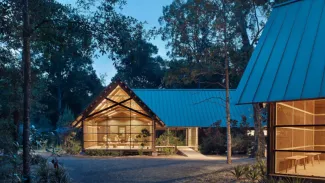
Marine Education Center at the Gulf Coast Research Laboratory
Ocean Springs, Mississippi | Lake|Flato Architects in collaboration with Unabridged Architecture
It was vital for the project to demonstrate responsible water conservation and stormwater management. Steep-sloping roofs quickly shed rainwater. Using French drains, rainwater from the main administration building’s roof goes into a 3,000-gallon underground fiberglass cistern and is utilized for flushing toilets. Landscape plantings are 100% native not just to the South, but to the specific ecotones. No potable water is used for irrigation, as Ocean Springs receives 67 inches of annual rainfall.
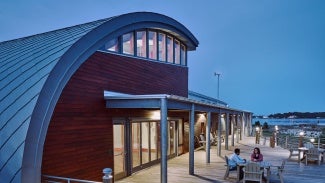
Brock Environmental Center
Virginia Beach, Virginia | SmithGroupJJR
“For buildings to withstand sea-level rise, coastline erosion, and hurricanes, they need to be built to work with nature, not against it. The Brock Environmental Center is a living example of how to minimize impact on the environment while being resilient to future challenges. The triple net zero building is the latest to receive Living Building Challenge certification and the first in the U.S. to receive a permit for drinking rainwater treated to federal standards.
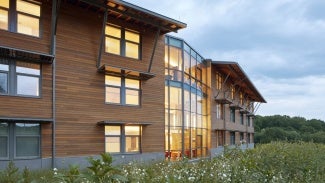
Chatham University Eden Hall Campus
Richland Township, Pennsylvania | Mithun
While Eden Hall Campus sits at the headwaters of the Ohio and Mississippi River watersheds, pine plantations, agriculture, and invasive plants have contributed to soil erosion and sedimentation of creeks, and municipal sewer overflows contaminate water quality. This project takes an integrated approach to water resources, management of nutrients, and mitigation of impervious surface. A constructed wetland wastewater treatment system provides superior wastewater treatment on-site with effluent used for toilet flushing and infiltration.
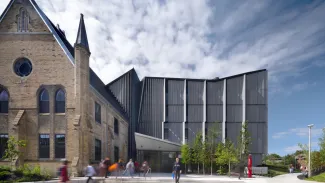
Daniels Building at One Spadina Crescent
Toronto, Canada | NADAAA with Adamson Associates Architects & ERA Architects
The roof was designed as a scissor truss that spans the core school community space. The roof brings daylight but was also designed to capture and funnel stormwater. Part of the design intent of the roof system was to put on display the roof capture. The flow of the water is also made evident on the east and west façades of the building. The silhouette of these façades reflects the hydrological organization of the roof system: Drawing the water down a central downspout that serves as a reveal between the original building and the new addition. In essence, it has abstracted the neo-gothic features of the existing structure as the basis for manipulation and extension. Systems are in place as the green roof’s GRIT lab grows to reuse this captured stormwater. The landscape around the project meets the municipal and LEED targets for on-site stormwater management through a combination of bioswales, water gardens, and retention cisterns. The collected stormwater satisfies 100% of the project’s irrigation needs. Both the underground storage and rain gardens deliver best practices in protecting the watershed.
This publication is designed to provide accurate and authoritative information in regard to the subject matter covered. It is published and distributed with the understanding that the publisher is not engaged in rendering professional services. If professional advice or other expert assistance is required, the services of a competent professional person should be sought.
AIA does not sponsor or endorse any enterprise, whether public or private, operated for profit. Further, no AIA officer, director, committee member, or employee, or any of its component organizations in his or her official capacity, is permitted to approve, sponsor, endorse, or do anything that may be deemed or construed to be an approval, sponsorship, or endorsement of any material of construction or any method or manner of handling, using, distributing, or dealing in any material or product.
If you have any questions or feedback regarding the Framework for Design Excellence, please let us know.
Learn how the framework inspires and provides a toolkit for sustainable, resilient, and inclusive design.
Explore the next chapter of the Framework for Design Excellence—Design for Economy
